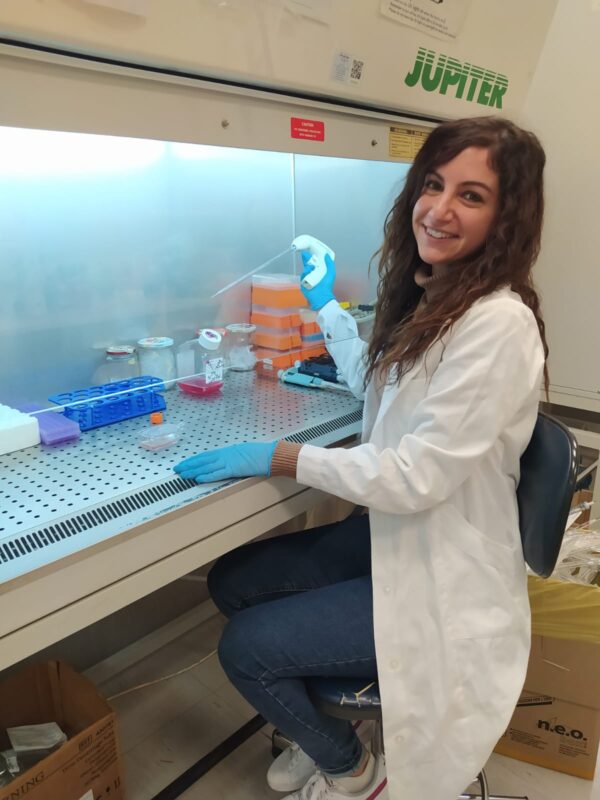WHAT IS YOUR BACKGROUND?
The world of natural sciences has always fascinated me, in particular cell biology and the possibility of studying the physical and chemical processes underlying the phenomena that characterize living systems and organisms. My personal experiences have strongly influenced the choice of my university career and made me motivated and passionate about research.
After graduating in Molecular and Industrial Biotechnology at the Università degli studi di Napoli “Federico II”, I started building up my experience in cancer biology during my PhD, at the Università degli studi della Campania “Luigi Vanvitelli”. The main focus of my research was the study of the anti-proliferative effects of natural compounds on different types of human cancers. During my PhD, I spent four months at the CIC bioGUNE institute in Bilbao, Spain, as part of the Erasmus traineeship program. This experience allowed me to deepen my knowledge on cancer and boosted my professional growth. After my PhD, I won a postdoctoral research fellowship in the Gastrointestinal Cancer laboratory lead by Dr. Enza Lonardo, at the Institute of Genetics and Biophysics “A. Buzzati Traverso” (IGB-ABT) of the National Research Council (CNR) of Italy, in Naples. The main research project was targeting of the cancer stem cells-tumor microenvironment crosstalk to improve pancreatic cancer prognosis. Most recently, I have won a prestigious scholarship funded by the “Fondazione Italiana per la Ricerca sulle Malattie del Pancreas” (FIMP). My project will try to clarify the role of collagen derived from cancer cells in pancreatic tumors and to stratify patients on the basis of the expression of their tumor epithelial collagen to develop personalized treatments.
I define myself as a very determined person, who loves lab life, studying and finding solutions to problems. I love teamwork and to create a peaceful working environment; I believe it is fundamental for developing new ideas and reaching notable results.
WHY DID YOU CHOOSE TO DO RESEARCH ON PANCREATIC CANCER?
It actually happened by chance; I was looking for a Postdoctoral position in an exciting and multidisciplinary environment, which would allow me to expand my skills in cancer cell biology. Starting to work in the laboratory of Dr. Enza Lonardo allowed me to study cancer with a completely new approach, which ranges from the use of complex in vitro systems (e.g. 3D organoid cultures) to in vivo mouse models. Moreover, I joined an exciting environment that allowed me to start new collaborations and to carry out my own ideas. In fact, I recently spent two months in the Cancer Stem Cell laboratory lead by Dr. Bruno Sainz in Madrid, to study the mitochondrial metabolism of pancreatic cancer cells.
WHAT IS YOUR RESEARCH ABOUT?
During the last three years as a Postdoctoral researcher, the main focus of my research has been to explore the contribute of TGF-β signaling to the progression, metastatic spreading and chemoresistance of pancreatic ductal adenocarcinoma (PDAC). My research project is part of the prestigious My First AIRC project (Targeting the cancer (stem) cells – tumor microenvironment crosstalk to improve pancreatic cancer prognosis) lead by Dr. Enza Lonardo. The skills I have acquired in these years of fellowship have allowed me to develop a new line of research, which aims to study the direct contribution of pancreatic cancer cells to the extracellular matrix stiffness by analyzing the role of epithelial-tumoral collagen. My project is currently being funded by the FIMP foundation.
WHAT ARE THE RESERCH PERSPECTIVES AND THE IMPACT OF YOUR WORK?
Although significant advances have been made in the fight against pancreatic cancer, we are far away from having successful therapies. The main goal of my project is to increase survival of pancreatic cancer patients by exploring the contribution of the tumor microenvironment to the failure of presently available oncological treatments. My findings will pave the way to 1) identifying additional factors/genes involved in the metastatic spreading and expressed by the different tumor cell subpopulations in vivo and in an organ specific manner, 2) improving the patient staging system, and 3) identifying ways to interfere with the metastatic process, thus opening novel ways for the development of diagnostic and therapeutic strategies for PDAC.
WHY IS IT IMPORTANT TO BE PART OF THE I-PCC?
Being part of the Italian Pancreatic Cancer Community allowed me to undertake new collaborations with other researchers working on pancreatic cancer who also have different backgrounds. I believe it is an excellent opportunity to facilitate the exchange of knowledge and also of materials.
WHEN YOU ARE NOT IN YOUR LAB WHAT DO YOU LIKE TO DO?
I generally spend my free time with friends, visiting new places or going to dance.



